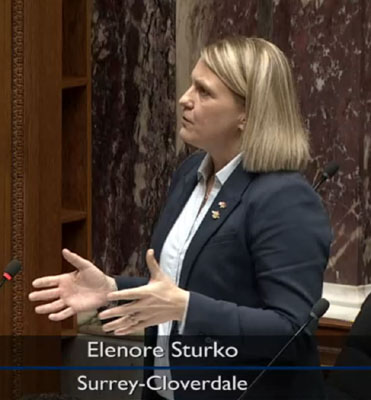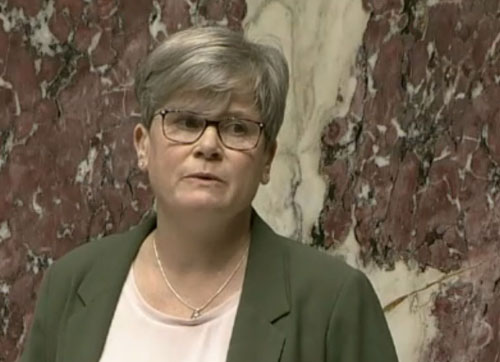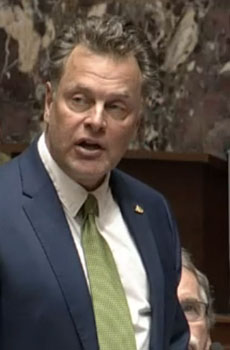Thursday February 20, 2025 | VICTORIA, BC [Posted at 7 am | Updated at 10:42 am | Updated February 23, 2025]
by Mary P Brooke | Island Social Trends
On the first day of the 43rd Parliament legislative session, the BC Government provided an update on pharmacy investigations and prescribed alternatives.
Health Minister Josie Osborne delivered a lengthy description of the immediate changes during a press conference at at the legislature at 12:30 pm, along with Public Safety Minister Garry Begg. Osborne was later questioned by the Official Opposition in Question Period at 2 pm.
The Province says it is taking action to prevent the diversion of prescribed opioids and hold bad actors accountable for putting people and communities at risk. About 60 pharmacies in BC were allowing for illegal trafficking of drugs by way of the previous prescribed supply program.
About 3,800 people are on the drug diversion program. During the course of the program over the last few years about 22 million pills were disbursed by pharmacies.
New program:
This announcement builds on work underway to build a seamless system of mental-health and addiction care to better meet people where they are at and provide them with supports at every stage of journey. That is why the Province is taking actions, such as enhancing overdose-prevention services, supervised consumption sites and drug checking. These services keep people alive, giving them a chance to connect to care and find a path forward.
The topic of drug deaths and the Prescribed Alternatives Program was the subject of Question Period again this morning. Osborne today emphasized the people-centered and compassionate approach that the government is trying to take.
Prescribed Alternatives Program:
The Prescribed Alternatives Program helps save lives by separating people at the highest risk of overdose from toxic street drugs and predatory drug dealers. It is one part of the Province’s work to address the toxic drug crisis, in addition to the expansion of treatment and recovery services, early intervention and prevention, supportive housing and more.
“We are committed to saving lives and getting the people who are suffering from addiction the treatment they need,” said Minister Osborne.
“In doing this work, we need to know that medications, like prescribed alternatives, are being used by the person they’re intended for. Prescribed alternatives have been proven to save lives by providing a safer option for people at high risk of overdose. We are requiring that the use of prescribed alternatives must be witnessed by a health professional. This will remove the risk of these medications from ending up in the hands of gangs and organized crime.”
The Province is revising the Prescribed Alternatives Program to require that the consumption of all prescribed alternatives must be witnessed by health professionals, ensuring they are consumed by their intended recipient.
- This requirement will be implemented immediately for new patients.
- The Province will work with clinicians to transition existing patients to witnessed consumption as soon as possible, while ensuring continuity of care.
During question period, Premier David Eby admitted that the witnessing requirement will very likely result in some people not being served by the health care system as intended. Not everyone using drugs will want to participate in witnessing. But for the sake of the overall program (intended to save lives), the province has decided that this is the way to go.
College of Pharmacists will play a role:
Since 2024, the Ministry of Health’s Special Investigative Unit, in collaboration with the College of Pharmacists of BC and law enforcement, has been investigating pharmacies suspected of engaging in illegal activities, including misusing fee-for-service payments to offer incentives to attract patients. So far, the Ministry of Health has received allegations against more than 60 pharmacies.
In cases where wrongdoing is confirmed, the Ministry of Health will, in co-ordination with the College of Pharmacists of BC, ensure that a pharmacy’s licence is suspended or cancelled, made ineligible to bill PharmaCare and referred to law enforcement as appropriate.
Pharmacy fee structure:
The Province will make changes to fix the fee structure for pharmacies that provide prescribed alternatives.
Fees will be restructured for daily dispensing to better align with the cost of providing service and avoid financial incentive for bad actors to offer kickbacks to retain and attract new patients, and to try to take advantage of the system.
Reduce over-prescribing:
The Province says it is working with partners to take action to reduce the over-prescribing of opioids generally by health-care providers. In December 2024, 97% of the people who were prescribed an opioid medication in B.C. received it for reasons unrelated to prescribed alternatives, such as pain management.
“The overwhelming majority of pharmacies and prescribers follow the rules, but it is unacceptable that bad actors are exploiting the health-care system and putting communities at risk,” Osborne said. “We are working with law enforcement to stop illegal activity and ensure pharmacies operate in the best interests of patients and public safety.”
Working group:
The Province will establish a working group with the College of Physicians and Surgeons and the College of Nurses and Midwives to investigate the inappropriate prescribing of opioids and take action to reduce overprescribing, including enhanced monitoring and additional guidance.
Opposition comments:
The problem is the policy, says BC Conservative Health Critic Elenore Sturko. She says the government has tried “to fix the drugs rather than people’s lives”, says Sturko. Over the past two and half years she has been pressuring the BC NDP government to make changes to the program.

“We are disappointed by the Minister’s decision to move to a witnessed consumption model,” says BC Green House Leader Jeremy Valeriote. “While we recognize concerns about diversion, this approach raises serious questions about effectiveness and unintended consequences.”
“For people trying to maintain employment, care for their families, or simply live their lives, the requirement to visit a pharmacy multiple times a day is untenable. Instead of maintaining access to life-saving medication, this change risks pushing individuals back to the illicit supply chain, increasing overdose risks, and worsening the crisis the BC NDP is trying to address,” says Valeriote.
===== RELATED:
NEWS SECTIONS: HEALTH | 43rd PARLIAMENT of BC










